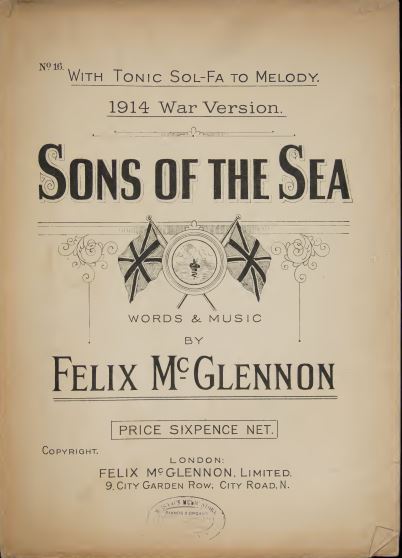Sons of the sea
| First Published | 1897 |
| Writer/composer | Felix McGlennon | Roud | RN32467 |
| Music Hall Performers | Arthur Reece |
| Folk performances | Collected from the singing of: Keeping family, London England, 1930s |
Have you heard the talk of foreign powers, Building ships increasingly? Do you know they watch this Isle of ours, Watch their chances unceasingly? Have you heard the millions they will spend, Strengthening their fleets, and why? They imagine they can break or bend The nation that has oft made them fly But one thing we possess, they forget, they forget The lads in blue they've met, often met, often met. Sons of the sea, all British born Sailing every ocean, laughing foes to scorn They may build their ships, my lads And think they know the game But they can't build boys of the bulldog breed Who made old England's name. Do you know they threaten to combine Three to one's their bravery? Do you know they'd like to sweep the brine Bind us lads in slavery? Have you heard they think that plates of steel Plates of steel and guns will do? But we know 'twas British hearts of oak In every battle pulled us safely through For one thing we possess, they forget, they forget The lads in blue they've met, often met, often met. If they'd know why Briton rules the waves If they'd solve the mystery If they'd know the deeds of Britain's braves Let them read their history Let them search the bottom of the seas Where their battered hulks now lie Let them build their puny ships of war We build men prepared to do or die There's one thing we possess, they forget, they forget The lads in blue they've met, often met, often met.

Another patriotic song from the prolific songwriter and composer Felix McGlennon, in this case he wrote the music to words provided by Arthur Reece, who also performed the song. It was originally written in 1897, but was revived and republished beginning of the First World War.
Reece was a major star in the halls, but tended to only be remembered for this song. Many of the overly patriotic songs in this period have been forgotten, but this one lived on. This may be partly because Reece continued to perform it in Music Hall revival shows until the late 1950s.
Here is a contemporary review of an early performance by Arthur Reece:

The song became directly associated with the bravery of British sailors as a result of a peacetime tragedy. In April 19o8 during a heavy snowstorm at the mouth of the Solent, the cruiser Gladiator collided with the 800 berth passenger ship St Paul, and sank. As the sailors on Gladiator waited to board the lifeboats they stood to attention and sang this song, right up to the point where the ship keeled over and sank. Whilst a number of sailors survived by swimming to the shore, the collision and sinking claimed 28 sailors’ lives. Many newspapers reprinted the lyrics to the song as part of the story – the publicity around this event may have helped to keep the song in the public attention.
It is perhaps not surprising that the song was successfully parodied, see the entry for Bobbing up and down like this
A recording from 1914:
Sources:
- Entries in the Roud Indexes at the Vaughn Williams Memorial Library: https://archives.vwml.org/search/all:single[folksong-broadside-books]/0_50/all/score_desc/extended-roudNo_tr%3A32467
- Kilgarrif Sing Us
- Lyrics: monologues.co.uk
- Sheet Music (1914 edition): archive.com
- Story of The Gladiator: Dundee Evening Telegraph – Monday 27 April 1908
- Mudcat thread